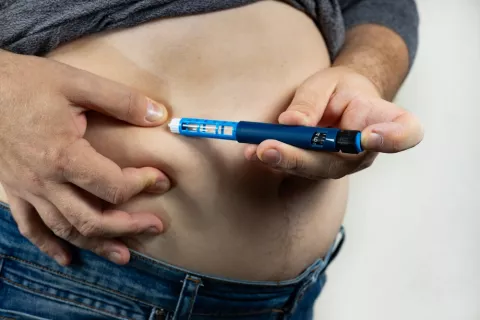The COVID-19 vaccine could be associated with a higher risk of developing autoimmune hepatitis, and this could manifest itself with a rise in transaminases after receiving the injection. This has been the finding of a study that has been presented at the 47th Congress of the Spanish Association for the Study of the Liver (AEEH) and that has been based on information provided by nine Spanish hospitals.
In this research, the data of 25 patients of 51 years of age from nine hospitals have been analyzed. Of the total, 14 were vaccinated with Pfizer-BioNTech, five with AstraZeneca, four with Moderna and two with Janssen. The results were obtained thanks to the RUCAM score, a method that measures the possible causal relationship between drugs and liver injury.
The findings showed that there was an association between the vaccine and some liver disorder in more than half of the participants, specifically in 13 of 25. In addition, an at least probable diagnosis of autoimmune hepatitis was found in no less than 70% of the cases, and the average time it took for the hepatitis episode to appear after administration of the vaccine was 19 days.
Although this figure is high, the researchers have reported that the hepatitis was mild in 22 of the 25 cases, in another patient it was severe, and it killed the remaining two. Researchers have stated that cases of autoimmune hepatitis related to vaccination against COVID-19 are very rare; Only 25 cases of more than 94 million doses that have been administered in the country have been reported in Congress.
Corticosteroid therapy may be helpful
Magdalena Salcedo, one of the study researchers, has stated that “without the vaccines, we would not be in the current situation of controlled infection; You just have to see how the populations are in countries with lower vaccination rates, where there is still high mortality, especially among the most vulnerable population. Vaccines have allowed us to normalize our lives, and the balance between the possible risks and the benefit obtained is beyond any doubt”.
In 70% of the cases studied, there was at least a probable diagnosis of autoimmune hepatitis, which appeared 19 days after COVID vaccination
This type of hepatitis, which causes destruction of liver cells by the immune system itself and inflames the liver, can also occur in relation to other vaccines, but it is a minor immune reaction in some susceptible people and is usually transient and controllable.
This possible association should continue to be investigated, as another study published in the journal Hepatology also follows this line. In this case, 87 people from 18 countries were analyzed and it was observed that the liver injury was mainly hepatocellular, in 84%, and 57% of the participants presented signs of autoimmune hepatitis.
Depending on the vaccines, 59% of cases occurred in people vaccinated with Pfizer, 23% with AstraZeneca, and 18% with Moderna. In this case, 53% of the patients could be intervened with corticosteroid treatments and all, regardless of the degree of the disorder, had resolution of the liver injury, except for one man who had liver failure and required a liver transplant.
In conclusion, they believe that corticosteroid therapy may be beneficial in people with immune-mediated features or severe hepatitis and consider that the outcome was favorable, but that the liver injury associated with the COVID vaccine caused liver failure that ended the life of one patient. .
Although there is no need to be alarmed until there is more stable evidence, clinicians should be alert to a possible sudden rise in transaminase levels in people who have recently been vaccinated against the coronavirus, as it could be a key indicator that could put in alert to the toilets before a possible case of autoimmune hepatitis.
.












